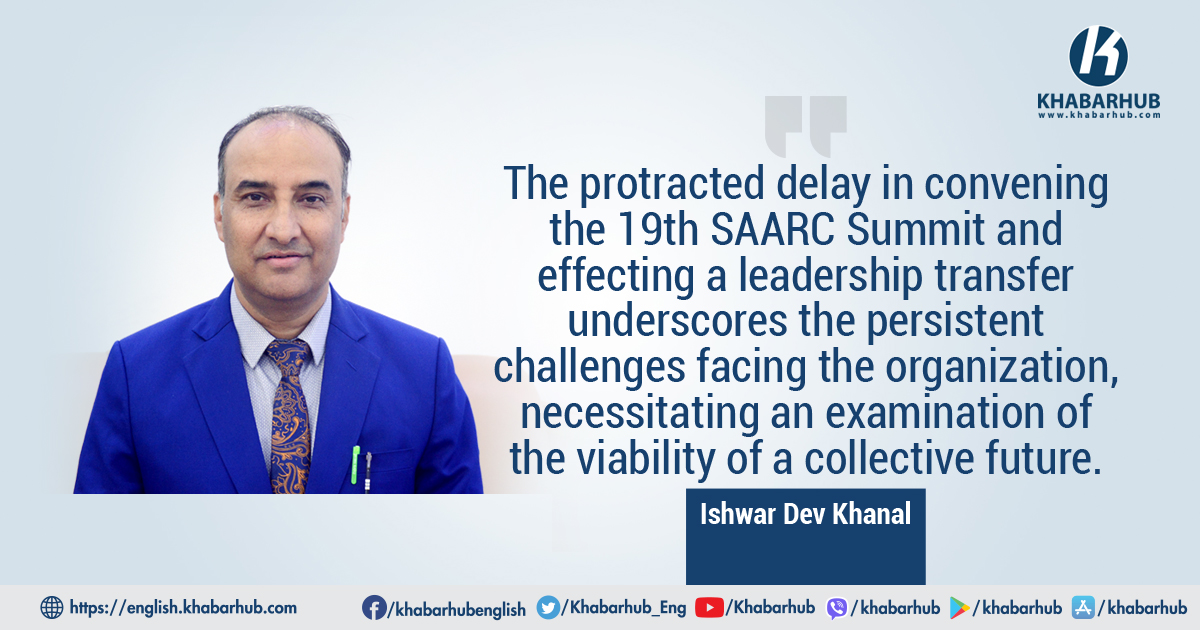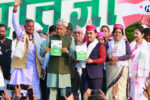As the South Asian Association for Regional Cooperation (SAARC) marked its 39th anniversary, leaders of member states convened to address the challenges confronting this regional alliance, which is currently navigating an existential crossroads.
The intricate history and cultural tapestry shared by these nations are undeniable, with each member country standing out due to its cultural, ethnic, and religious affinity that transcends recent political developments.
Additionally, member states exhibit cross-border similarities in traditions, languages, and customs, underlining the potential for a unified identity.
Regrettably, an existential crisis looms large over SAARC, exacerbated by the enduring rivalry between India and Pakistan.
The deadlock that emerged in 2016, triggered by India’s abstention and fueled by political tensions and an attack in Kashmir, continues to impede progress.
The protracted delay in convening the 19th Summit and effecting a leadership transfer underscores the persistent challenges facing the organization, necessitating an examination of the viability of a collective future.
A fundamental question arises: Can these nations forge a cohesive South Asian identity in the face of shared struggles such as poverty, terrorism, climate change, and meager intra-regional trade?
While economic trends and democratic governance have buoyed member states, fostering substantial potential for foreign investment, a pressing need for closer integration emerges to fortify regional stability.
As Nepal assumes the chairmanship, a pivotal question emerges: Can it effectively implore India and Pakistan to resolve their differences bilaterally and cultivate an environment conducive to the resumption of regional processes?
As a regional powerhouse, India is poised to lead in fostering development by cultivating robust relations with neighboring countries, leveraging energy resources, and assuming a pivotal role in advancing the region.
In the midst of existential challenges, SAARC’s 39th anniversary commemoration saw leaders reaffirming their commitment to collaboration.
Statements issued by heads of governments, including Indian Prime Minister Narendra Modi and Pakistani Prime Minister Muhammad Shehbaz Sharif, underscored the significance of regional cooperation.
However, the bloc grapples with the arduous task of convening regular summits, exemplified by the cancellation of the 19th Summit due to enduring tensions between India and Pakistan, prompting questions about the consistency of such declarations.
The SAARC charter emphasizes historical and cultural bonds, advocating for regional peace, stability, and progress.
However, concerns arise as India redirects its focus towards global forums like BRICS and G20, potentially diluting its commitment to SAARC.
Ministerial-level meetings came to a halt following the ascension of the Taliban in Afghanistan in 2021, dealing a blow to the SAARC process.
Therefore, member states must translate their vision into tangible achievements, drawing inspiration from the accomplishments of other successful regional organizations.
Vital meetings at the programming committee and joint secretary levels have regrettably failed to convene in the past two years.
As Nepal assumes the chairmanship, a pivotal question emerges: Can it effectively implore India and Pakistan to resolve their differences bilaterally and cultivate an environment conducive to the resumption of regional processes?
Established in 1985, SAARC aimed to elevate the quality of life, propel economic growth, and foster mutual trust, understanding, and appreciation among member states.
However, the efficacy of SAARC has been hampered by divergent principles.
Reviving SAARC necessitates transcending differences among member states and prioritizing common interests, particularly in areas like infrastructure and technology.
Effectively addressing poverty and terrorism demands collective action from member states, recognizing South Asia’s renewed geopolitical significance and economic potential.
Therefore, member states must translate their vision into tangible achievements, drawing inspiration from the accomplishments of other successful regional organizations.
In doing so, SAARC can navigate its existential crossroads and emerge as a resilient and impactful force for regional cooperation and development.








Comment